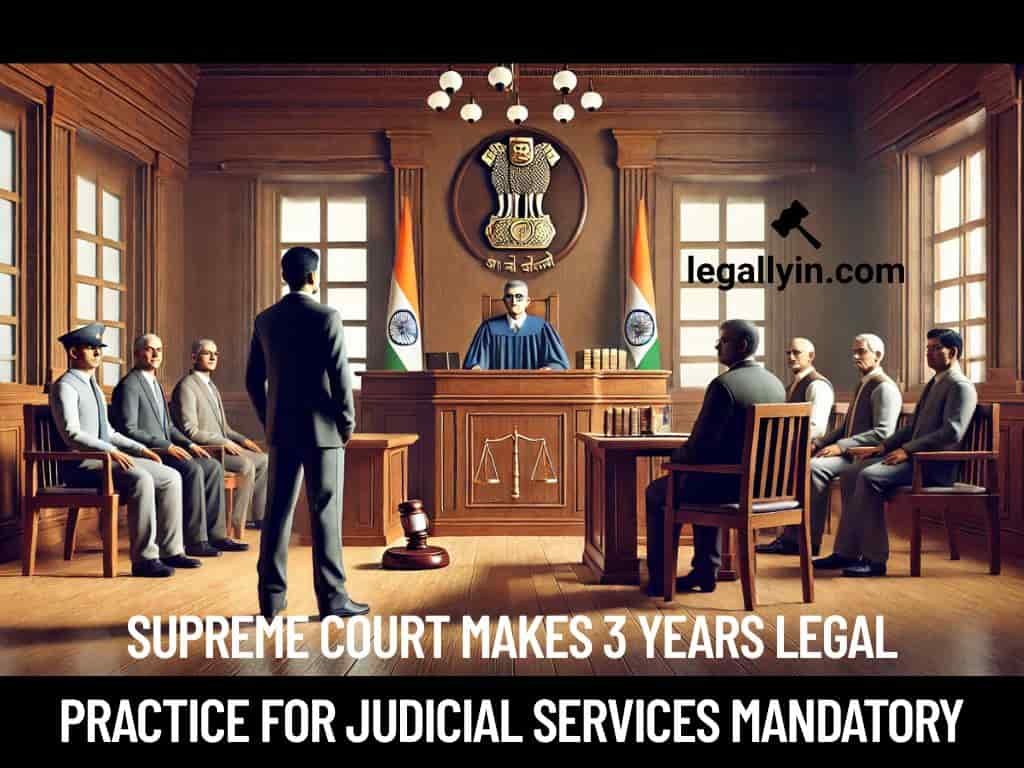Supreme Court Makes 3 Years Legal Practice for Judicial Services Mandatory : What Law Students Must Know

In a landmark decision that directly affects thousands of law graduates across India, the Hon’ble Supreme Court has mandated that a minimum of three years of legal practice is now essential to be eligible for entry into the judicial services, particularly for the post of Civil Judge (Junior Division). This ruling is expected to significantly reshape how law students plan their careers in the judiciary.
What Did the Supreme Court Say?
On 20 May 2025, the Supreme Court, in the case of All India Judges Association v. Union of India, held that:
- Only those candidates who have at least 3 years of experience as an Advocate will be eligible to apply for judicial service posts such as Civil Judge (Junior Division).
- This period of 3 years will be counted from the date of provisional enrolment with the Bar Council.
- This rule will apply to future recruitment processes only. If any recruitment has already started or has been notified by a High Court, this rule will not apply to those processes.
Why Did the Court Give This Ruling?
The Supreme Court observed that:
- Allowing fresh law graduates to join the judiciary without any courtroom experience has caused many practical problems in the justice delivery system.
- A judge needs more than just book knowledge — they must have practical exposure to courts, knowledge of procedures, and real-time legal understanding.
- Hence, real-life legal practice is necessary before someone is trusted with the responsibility of delivering justice.
“Neither knowledge based on law books nor pre-service training can substitute for first-hand experience of court proceedings.”
The Court emphasizes that theoretical knowledge and training cannot replace the invaluable insights gained through actual courtroom experience. This underscores the necessity for aspiring judges to engage in real-world legal practice before assuming judicial responsibilities.
“Complex issues relating to life, liberty, and property require more than textbook knowledge.”
Addressing the multifaceted nature of legal disputes, the Court asserts that resolving such matters demands more than academic understanding. Practical experience equips judges with the discernment needed to navigate the intricacies of real-life cases effectively.
“The judicial service is not service in the sense of ’employment’. The Judges are not employees. As members of the judiciary, they exercise the sovereign judicial power of the State.”
This statement describes the unique role of judges, distinguishing them from typical government employees. It highlights the judiciary’s integral position as one of the three pillars of the State, entrusted with upholding justice and the rule of law.
Read More: Can a Second Wife Get Maintenance?
BNS Section 336 Forgery in Hindi (दस्तावेजों की जालसाजी)
Who Can Issue a Certificate of Practice?
To prove that you have three years of practice, you will need a Certificate of Experience:
- This must be issued by either:
- A Principal District Judge, or
- An Advocate with 10 or more years of standing in the Bar.
- A Principal District Judge, or
- The certificate must be verified by the judiciary.
- If you practiced in a High Court or Supreme Court, a designated judicial officer must countersign the certificate.
Experience as a Law Clerk Will Also Count
In an important clarification, the Court said:
Experience gained as a Law Clerk (attached to a judge or a court) will also be considered valid towards fulfilling the 3-year practice requirement.
This is a major relief for fresh graduates who opt to work as Law Clerks instead of entering direct court practice.
What Should Law Students and Aspirants Do Now?
If you are currently pursuing law and dreaming of a career in the judiciary:
- Start planning early to enroll with the Bar Council as soon as you graduate.
- Gain active court practice under a senior advocate.
- Alternatively, work as a Law Clerk with a High Court or Supreme Court judge to gather credible experience.
- Keep detailed records of your work and obtain practice certificates from competent authorities.
Why Is This Decision Important?
- It ensures that only experienced advocates become judges.
- It promotes a better understanding of real legal issues and helps maintain the quality of justice.
- This also brings back the pre-2002 position, where legal experience was necessary before becoming a judge.
Summary Table
| Criteria | Details |
| Eligibility | Minimum 3 years of legal practice |
| Effective From | Future recruitment exams only |
| Valid Experience | Practice as advocate or law clerk |
| Certificate Issued By | Principal judge or 10-year standing advocate |
| Practice Counted From | Date of provisional enrolment with Bar Council |
Final Thoughts
This Supreme Court ruling is a game-changer for judicial aspirants. It reaffirms the importance of courtroom experience and legal maturity in shaping India’s judicial system. For law students, it means planning early, gaining real legal experience, and viewing the judiciary as a profession that requires both knowledge and practical wisdom.
Stay tuned to LegallyIn.com for regular updates, detailed case summaries, and expert guidance on judicial exams and legal careers in India.
